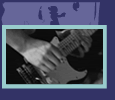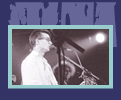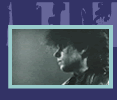|
|
DESERT
BLOOM: Memories from a Reporter's Lost Notebook
A
look back at the first Cactus World News concert in Boston Massachusetts
USA; March 1986
In
historical terms, fifteen years may not seem like a terribly long
time, but in 1986 the world was a very different place.
Reagan,
Thatcher and Gorbachov were in power, and nuclear proliferation
was The Big Issue. Back then, things like cellphones, email, MP3's
and the Internet were beyond fantasy; heck, people were glad to
have calculators, forget laptops. Cassette Walkmans were widely
available, but CD players were only just emerging. Word processing
was something done on an electric typewriter, and faxes or international
long-distance calls were still a significant luxury. For that matter,
Cable TV (and hence MTV) was a rarity in some parts, and satellites
were the exclusive domain of rocket scientists, not channel surfers.
And the handful of TV channels you could get through your home antenna,
all shut down just after midnight.
In
the absence of so many of today's available diversions, contemporary
music seemed to occupy a more prominent position in the minds and
lives of young people. With fewer options to choose from, events
like album releases, live concerts, and alternative music radio
shows had a significantly higher public profile. In this atmosphere,
Music provided not just great entertainment, or a memorable soundtrack
for day to day life, but it somehow seemed to take on the mantle
of something more vital, more immediate, and more important. More
than any other form of artistic expression of the time, Rock Music
not only encompassed aspects of fashion, media, politics, religion,
current events, and social issues, but forged them into a cohesive
alloy. In doing so, it moved beyond simply reflecting, to actually
affecting, the world around it. Its influence became so pervasive
that it became a means of distinguishing personal and collective
identity. As a result, it wasn't just a focal point, but an embodiment,
of contemporary youth culture. Rock Music, in a word, mattered.
Looking
back on it now, the world seemed like a bigger place then. Fewer
people travelled as widely, and mass media wasn't as globalised.
In a world less-homogenised, foreign culture seemed more exotic,
and specialised information from beyond one's shores was harder
to find. But if you were willing to expend some effort, one place
you could savour the triumph of international discovery was at a
specialist record store. For me, (then a university grad and aspiring
music journalist), this turned out to be Newbury Comics in Boston
where Aimee Mann had worked in her pre- Til Tuesday days. There,
one could buy the almost-impossible-to-find (and hideously expensive)
air-freighted current issues of the British/ Irish Music Weeklies
(NME, Melody Maker, Hot Press, etc.), as well as the imported vinyl
LP's that they discussed.
Walking
out of the store with an elusive issue or album tucked under your
arm (and which might just have been printed or pressed in London
that same week) wasn't just a thrill, it turned out to be a bit
of a personal statement. Complete strangers on the subway would
sometimes strike up a conversation simply on the basis of having
noticed my latest imported purchase. Thus it turned out that music
wasn't just my drug of choice; it became a passport of sorts. It
transcended social boundaries and physical continents to link like-minded
people the world over. Best of all for me, this aural addiction
became self-financing. The money I earned stringing for local magazines
writing album and concert reviews went straight back into funding
my next musical discovery, in an attempt to stay a step ahead of
the mainstream U.S. media.
*
* * * *
Cactus
World News was one of those bands that caught my attention very
early on. The hint of a U2 connection intrigued me, and a serendipitously-discovered
import of The Bridge EP on Mother Records exceeded all expectations.
Such was its impact, that within a few weeks I went from extolling
its virtues to anyone who would listen, to rationing the all-too-frequent
requests to borrow it. When word came that the band would open their
first ever US tour in Boston, I had no trouble rounding up a group
eager to attend their stateside debut.
We
arrived early that cold March evening at the Spit Club, opposite
the back of Fenway Park's fabled "Green Monster" wall, and as luck
would have it, a crew were filming a commercial for the Club outside
the venue. Being somewhat alternatively attired (mid-80's ilk),
my then-girlfriend and I were enticed by the offer of Spit Club
membership cards, to act as extras in the commercial shoot. We were
between takes when a van pulled up and the members of the band disembarked.
Such was their profile at this point that I was the only one there
that actually recognised and greeted them, having seen pictures
in the British press.
Earlier
that day, CWN had succeeded in doing back-to-back live studio interviews
at both of Boston's premier Rock Stations, WFNX (alternative) and WBCN
(alternative/mainstream). None of us could remember the last time a band
had managed that. And while they seemed earnest and intriguing, they certainly
weren't 'yes' men. The WFNX DJ opened with: "So, you're from Dublin, does
that mean that you sound a lot like U2?" Whoops. Once the furore subsided,
they made it clear that while they respected U2, they were very much their
own band with their own sound, and would find their own audience. Score:
Cactus- 1, DJ- Nil.
Later,
inside the venue, we worked our way up to the front for what proved
to be an unforgettable evening. Back then I was attending a couple
of shows a week, but CWN made it clear from the onset that this
performance would stand out. Without so much as a greeting or a
tune-up, from out of the darkness they launched straight into the
set, delivering "Worlds Apart" with an intensity that the recordings
had only alluded to. I looked around me to find open jaws and blank
expressions. None of us had known what to expect, but they had it
all: Passion, Power, Integrity and Intellect, and their set served
up the goods in spades.
Intriguingly,
for a first concert in a foreign land, when most of the audience
were not yet familiar with their music, they put on a strikingly
confident performance. They didn't attempt to project their image
to the four walls, nor bash the crowd into submission with a non-stop
aural assault as so many others had done. Instead they dared to
use dynamics to draw the audience into their world. Their musical
range encompassed passages so ethereal they seemed capable of conjuring
up memories beyond personal experience; all liquefied notes dripping
from atmospheric beams of tantalising melody. At the other extreme
(no pun intended) it extended to segments aggressive enough to render
incarnate a musical approximation of a Volvo full of splintered
glass going through the spin cycle. Their performance covered the
horizons in-between and proved to be not just heartfelt, but somehow
personalised and contextualised to the audience and the occasion.
The results were stunning.
There's
a fascinating dynamic that occurs when performers and audiences
from opposite sides of the Atlantic encounter each other for the
very first time. In this instance, we'd read about them, and I'm
guessing they'd heard plenty about the USA, and on the night both
groups appeared genuinely intrigued to meet in the flesh. I have
no idea what they thought of us, but it seemed to me after an evening
of studied observation (which included a fair bit of eye-contact),
that their individual personalities were so distinctive and varied,
as to make us later wonder how these guys ever met to form a band!
Yet, there was no question that the four of them were on the same
page musically, having created something sonically representative
of their diversity.
At
stage-right, on Bass, Fergal MacAindris certainly looked the part;
all weighty boots, black clothing, and cool detachment. He anchored
the groove with elastic note progressions, concentrating more on
keeping things musically-tight with his bandmates than engaging
with the audience. At the back, Wayne Sheehy, with his bald head
rising intimidatingly above a notable rack of drums, oozed confidence
in his muscular authority of the sticks. This was punishing drumming;
(as in: THWACK!) felt, as much as heard, that could well have persuaded
the infantry to head for deep water.
Up
front, despite his bookish-rocker appearance, wiry Vocalist Eoin
McEvoy held centre stage with presence. He commanded the proceedings,
alternating his strumming to suit, and belting out vocals with verve.
Finally, at stage-left, stage-right, stage-back, and stage-front,
Guitarist Frank Kearns clearly had an axe to grind, using a mad-scientist's
lair of electronic gadgetry to coax a phalanx of aural effects out
of the guitar he brandished like a weapon. His sonic wizardry continued
to turn notes inside-out even after the band had left the stage,
with his guitar left hanging on his amp, feeding back through a
cycled set of effects, slowly fading, until the house lights came
up.
Needless
to say, they surprised and impressed from pillar to post. It was
the quickest 75 minutes I spent that year. At the end there was
a genuine buzz at the realisation that we'd all witnessed something
special. Not only was it the best club show we'd seen in yonks,
but we now had this band pegged as one to watch for the long haul.
On this evening, Cactus World News had announced their arrival in
no uncertain terms.
Ross Kuehne, London - November 2001
BACK
TO ARCHIVE - NEXT - PREVIOUS
|




